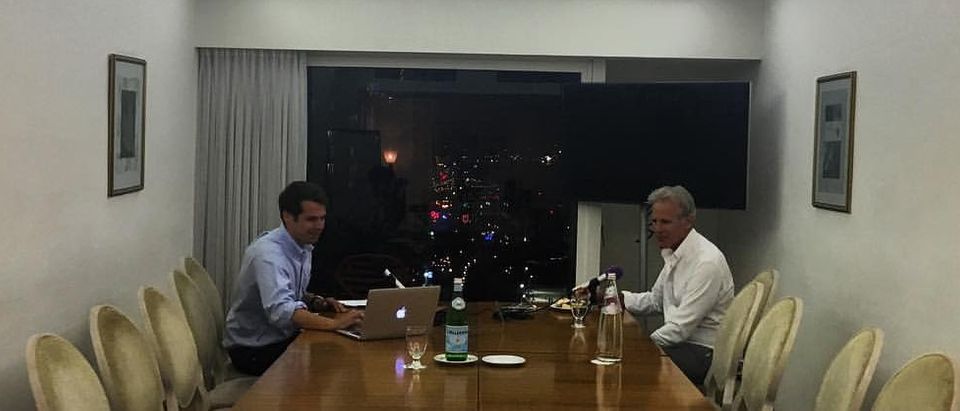TEL AVIV — Former Israeli Ambassador to the United States Michael Oren won’t take sides in the U.S. election — but that doesn’t mean he won’t express concerns about aspects of both Donald Trump and Hillary Clinton’s policies.
During an appearance on “The Jamie Weinstein Show” podcast, Oren opened up about how Israelis view the U.S. election, his view of America’s role in the Middle East, whether he has ambitions to be foreign minister or even prime minster one day, and so much more.
LISTEN:
Show Map:
- How Israelis view the American election, Trump and Clinton (9:39)
- The consequences of Obamaism to Israel and the Middle East (17:48)
- The anti-Israel trend of American progressives (28:52)
- Israel’s expanding international opportunities (33:20)
- On France’s Burkini ban (36:50)
- On what Netanyahu’s legacy will be (39:57)
- How Oren became a success only very late in life (42:58)
- Could there be a Foreign Minister — or even Prime Minister — Oren one day? (45:39)
You can Subscribe and Listen to the Podcast on iTunes, and be sure to leave a Rating and Review!
“I got a sneaking suspicion that people in Israel are following it more closely than people in the United States,” Oren, who was born in the U.S. but had to give up his American citizenship when he became an Israeli ambassador, said of the American presidential election when we recorded the interview earlier this month in Tel Aviv.
Though Oren steadfastly refuses to take a side in the election, he did express some concerns about both candidates.
Speaking of Trump, Oren said: “I don’t know what his policies are and when I go on the Israeli media, I have to say the three words that no political figure ever wants to say, certainly not in front of a live audience, I have to say, ‘I don’t know.'”
Oren also noted he spoke out against Trump’s proposal to ban all Muslims when the New York billionaire announced it last December (Trump has since modified the policy).
“When Donald Trump came out and said that Muslims wouldn’t be allowed into the United States after the attack in San Bernardino, I was a member of Knesset and I came out and condemned it because 20 percent of my countrymen here are Muslims,” Oren said. “I have to defend my countrymen.”
As for Clinton, Oren said that while he believes she is “less ideologically rigid” than President Barack Obama, he is concerned about what he views as the anti-Israel tilt of progressivism in American politics today.
“Hilary Clinton may have a different worldview but in Israel we cannot overlook the fact that she is a Democrat,” he said. “She defines herself as a progressive, she has defined herself as a progressive in these elections and being a progressive in American politics today carries with it certain assumptions about America’s relationship with Israel.”
Oren expressed concern that America was turning inward and argued that a Middle East without American leadership is a dark and dangerous place.
“I think I speak not just for most Israelis, but most people in this area, if not beyond it, in this region, is that we miss America,” he said. “We miss American leadership. If you want to know what the Middle East looks like without America in it, you could drive about two and a half hours from where we’re sitting here, north, you’ll be in the middle of the Syrian civil war. That’s what the Middle East looks like without America.”
Israeli Prime Minister Benjamin Netanyahu recently appointed Oren deputy minister in the Prime Minister’s office and head of public diplomacy. But does the noted historian have ambitions to one day serve as foreign minister — or, perhaps, even prime minister? When asked, Oren did not reject the idea out of hand.
“My whole life, really, since I was 15, has been about service,” he said. “It’s been about service to this country and to my people. Sometimes you serve in a major capacity, sometimes in a lesser capacity.”
“Some people would ask, ‘You were once ambassador, now you’re just a member of Knesset,'” he went on. “I thought being a member of Knesset was sort of the pinnacle of my career! I was elected to the first democratic Jewish body in 2,000 years. Now I’m serving in a different capacity and I’ll continue to serve. My field is foreign affairs and I hope to be able to apply my experience, my, I must say, hard-earned experience to Israel’s foreign affairs as we enter this, such great opportunities and challenges in our foreign relations.”
Listen to the whole interview to hear Oren discuss the Syrian civil war, how he didn’t achieve career success until very late in in life and much more.


